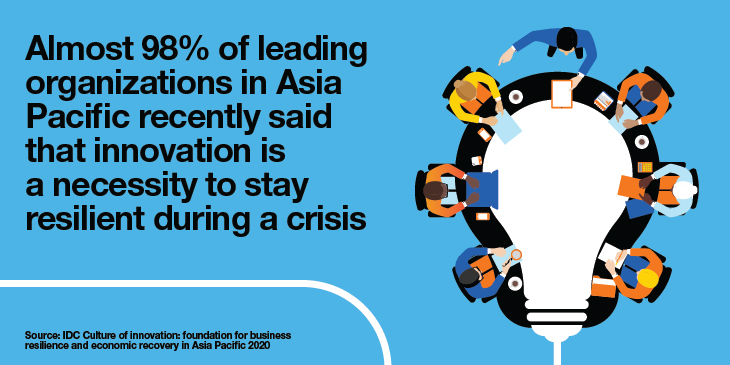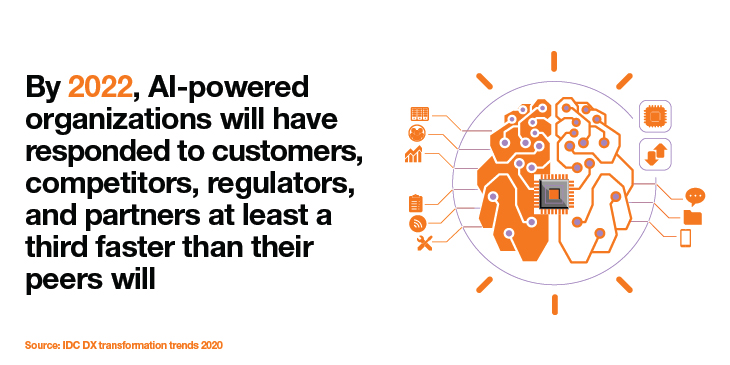Innovation is no longer a nice to have. It is essential for business survival as we move into a low-touch, high-care economy. Almost 98% of leading organizations in Asia Pacific, for example, recently said that innovation is a necessity to stay resilient during a crisis, according to a recent IDC survey. Nearly three quarters (73%) of Singapore organizations are now accelerating digitization in a number of ways to adapt to new market conditions and challenges, including introducing digital payments to embracing e-commerce and automation.
As a result, organizations are moving faster and taking bigger risks than they could have imagined only months ago, according to the World Economic Forum (WEF). To mitigate risk, maximize efforts and innovate successfully, the WEF recommends that organizations invest in innovation talent, seek out customers’ emerging demands and adopt a “tolerance for risk-taking” by using fast-to-fail experiments to help learn and succeed more quickly next time.
Offering easy access to core business applications, efficient collaboration tools and in-depth analytics solutions, cloud provides a critical and flexible foundation for this innovation. It has the potential to enhance trans-sectoral development, expand technological access to remote regions and connect artificial intelligence to other industry 4.0 technologies, according to WEF.

Future-proofing business
As business models change to come to terms with new market realities, the differentiators that some organizations previously had may not be that different or out of step with new trends. Business resilience has become a big issue.
While digitization has been knocking on the door for some time, the necessity to accelerate it has been significantly exacerbated by the crisis, according to McKinsey. At the same time, organizations have been forced to change business models to survive. Restaurants for example have launched take-away services ordered online to drive business while indoor seating has been restricted, for example.
Organizations that had previously focused on innovation have come out stronger. Companies that ramped up innovation in the 2009 financial crisis, for example, outperformed the market average by more than 30%, according to McKinsey, and continued to deliver growth several years on.
Companies that don’t transform and adopt cloud will struggle not only to survive, but also to remain close to their customers. They will find it almost impossible to exploit new revenue streams and will not have the economic advantage of scalability.
Accessing AI in the cloud
Opening new routes for innovation, artificial intelligence (AI) is fast becoming available in the cloud. We have already seen hyperscalers offer up AI services that can be used in current and greenfield applications. These include Google AI Prediction service, Google Cloud AutoML for Vision and Microsoft Azure Machine Learning Service.
According to an IDC forecast, by 2022 AI-powered organizations will have responded to customers, competitors, regulators and partners at least a third faster than their peers will have. If organizations don’t address their cloud maturity now, they will find themselves getting left behind.

Innovation requires a change in thinking
With cloud, and especially cloud native, you can build for change in a way that just wasn’t possible previously. Organizations can deliver new features and services in weeks as opposed to months and react to more compressed feedback loops in their development cycles.
Cloud native will bring organizations even greater agility, flexibility and development speeds. By adopting a cloud-native approach, innovation will be able to rapidly contribute to business value.
But in transforming, moving to the cloud and adopting a cloud-native approach to innovate, organizations will need to adopt agile, dynamic processes. If they don’t, they will end up leveraging only a small percentage of the advantages that next-generation cloud services bring. For CEOs, this means prioritizing an enabling mindset, not a restrictive one. Development teams will need the freedom to move quickly from idea to delivery and have access to the right tools and guidelines to innovate successfully. This will require a certain level of autonomy and trust. Product and services cycles will ultimately be shorter, but this must be achieved while maintaining quality.
Don’t assume you can build on what you have
It is important to understand that you can’t just put your current service model on top of the cloud and expect it to work. Just like you can’t turn VHS into video streaming. The building blocks and concept are fundamentally different, and this applies just as much to cloud. You will need to start from afresh and build your cloud estate over time.
This is where consultancy is important in building resilience into an organization’s roadmap and ensuring it maps with innovation plans. Organizations, no matter how large, only have so many competencies. Trusted partners like Orange Business can help fill the gaps and provide invaluable expertise in cloud-native security, continuous compliance and sustainability around tooling, for example.
It is time to start thinking cloud native
Cloud native and innovation are inextricably linked and will be central to any organization looking to manage risk long term. Organizations that adopt cloud native will inevitably see an increase in productivity, efficiencies and an enhanced user experience.
Organizations that haven’t started on their cloud-native journey should not put it off until tomorrow. It takes time to adopt the new culture and processes it demands, but the innovation capabilities and significant business advantage it brings will deliver the transformation all CIOs are after.
One cloud-mature fast moving consumer goods (FMCG) company is utilizing Orange Business cloud expertise to tap into a new wave of cloud-driven innovation and set a new standard for what a digital platform can do in its industry.

As a Chief Evangelist, Jan Aril focuses on sharing transparent and inspiring knowledge about his areas of expertise, such as public cloud, big data and AI, with the aim of helping companies take on a more sustainable innovation journey. He has more than two decades of experience in the IT-industry and has held positions from full stack development and sysadmin to C-level and board member. He works across the brands of Basefarm and Orange Business.